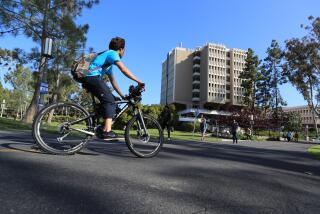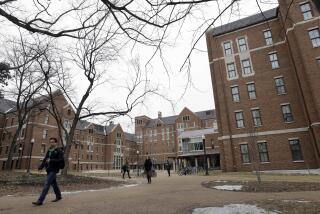Latest UCI Discovery: There’s Life After E-Mail
- Share via
When computers at UC Irvine’s division of university advancement caught the “Love Bug” virus, knocking out the e-mail system, employees found themselves scurrying in and out of their offices and work pods, sending and picking up faxes and grabbing phones.
They also conferred face to face with colleagues, and some said it was quite a pleasant experience.
Their cherished e-mail system had been restored Friday despite an outbreak of copycat viruses, but for a day, the office found itself on a trip back in time--at least to the early 1990s before e-mail became the main means of keeping in touch with the outside world and with each other.
“People were leaving their offices a lot more,” said Leslie Millerd, director of UCI Foundation relations. “We were cutting out valentines and putting them on people’s doors as a way of saying, ‘I need to talk you.’ ”
Executive assistant Toni Salas, 25, found herself delivering documents in person to people in other buildings on campus, noting that she was “pleasantly surprised” by the interaction.
About 150 people work in university advancement, an umbrella group responsible for areas such as alumni relations, community relations, finance and administration. They routinely spend hours glued to their computers, relying heavily on e-mail to communicate and transmit reams of documents.
“I would never have imagined when I started working 20 years ago that the loss of a computer would shut down the majority of my communications,” Millerd said.
As manager of the university’s endowment fund, Millerd receives an average of 50 e-mails per day from foundation members and colleagues on campus.
“I check it continually throughout the day when I’m at my desk,” she said.
On Thursday, the 43-year-old Capistrano Beach resident found herself picking up the telephone to take care of business that she would usually handle via e-mail.
“My e-mail is equally as important as my phone now,” Millerd said. “I fully expect that one day it will take over my phone.”
Tracy Childs, assistant director of media relations, said he felt “disconnected” without his e-mail. But he acknowledged that the he might have been more productive in some ways.
“When I get an e-mail, it flashes on my screen that it has arrived, and I can’t let it just sit there,” Childs said. “I read it right away, and sometimes that breaks your flow. It saves you time in some instances and slows you down in others.”
Mark Pearson, one of eight computer systems experts assigned to the university advancement department, was still fending off additional viruses Friday and installing antivirus programs. But he was hopeful that the worst had passed.
“I’m checking every hour on the hour for new [virus] files,” he said. “Otherwise, you have to go back to the old way of doing business, and you’re not as efficient anymore.”
More to Read
Sign up for Essential California
The most important California stories and recommendations in your inbox every morning.
You may occasionally receive promotional content from the Los Angeles Times.













